28% of 20- to 34-year-olds in the UK live with their parents, the highest share on record, see chart below.
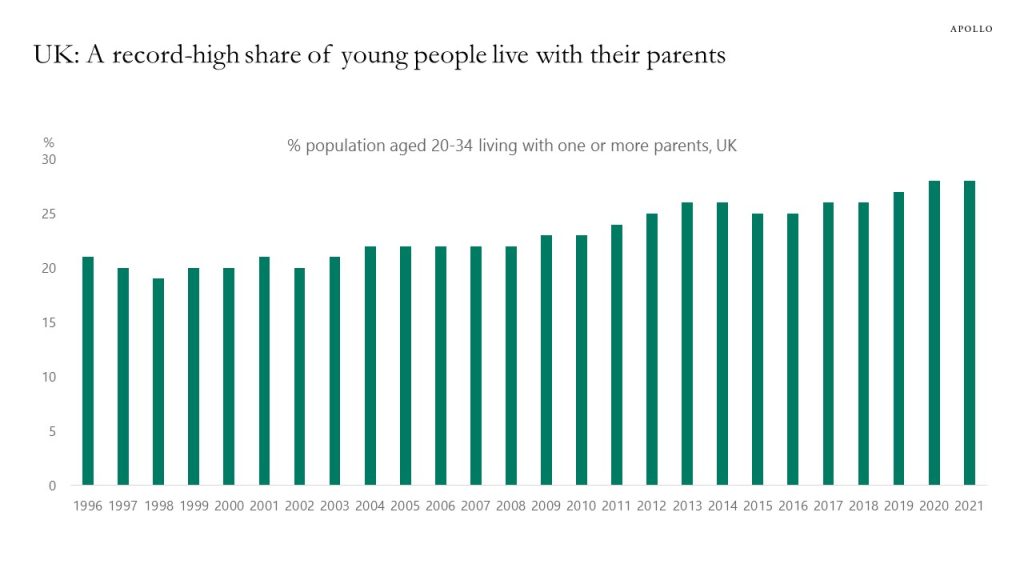


28% of 20- to 34-year-olds in the UK live with their parents, the highest share on record, see chart below.


Recent data is starting to reveal some weakening in the US economy, specifically with slower retail sales (in areas like furniture sales—and durable goods more broadly—and restaurant sales), risks of higher jobless claims (specifically a decline in small business hiring plans), and a rise in bankruptcies. Despite the fact that the latest employment report was strong—with 223,000 jobs created in December and an unemployment rate of only 3.5%—the daily and weekly high-frequency indicators we track are beginning to show signs of weakness. This is a signal that the economy is losing some momentum after a strong 2022—likely the result of the Federal Reserve hiking interest rates for much of last year.
This presentation may not be distributed, transmitted or otherwise communicated to others in whole or in part without the express consent of Apollo Global Management, Inc. (together with its subsidiaries, “Apollo”).
Apollo makes no representation or warranty, expressed or implied, with respect to the accuracy, reasonableness, or completeness of any of the statements made during this presentation, including, but not limited to, statements obtained from third parties. Opinions, estimates and projections constitute the current judgment of the speaker as of the date indicated. They do not necessarily reflect the views and opinions of Apollo and are subject to change at any time without notice. Apollo does not have any responsibility to update this presentation to account for such changes. There can be no assurance that any trends discussed during this presentation will continue.
Statements made throughout this presentation are not intended to provide, and should not be relied upon for, accounting, legal or tax advice and do not constitute an investment recommendation or investment advice. Investors should make an independent investigation of the information discussed during this presentation, including consulting their tax, legal, accounting or other advisors about such information. Apollo does not act for you and is not responsible for providing you with the protections afforded to its clients. This presentation does not constitute an offer to sell, or the solicitation of an offer to buy, any security, product or service, including interest in any investment product or fund or account managed or advised by Apollo.
Certain statements made throughout this presentation may be “forward-looking” in nature. Due to various risks and uncertainties, actual events or results may differ materially from those reflected or contemplated in such forward-looking information. As such, undue reliance should not be placed on such statements. Forward-looking statements may be identified by the use of terminology including, but not limited to, “may”, “will”, “should”, “expect”, “anticipate”, “target”, “project”, “estimate”, “intend”, “continue” or “believe” or the negatives thereof or other variations thereon or comparable terminology.
Our latest housing outlook for Europe is available here, covering the euro area, Germany, Spain, France, and UK.
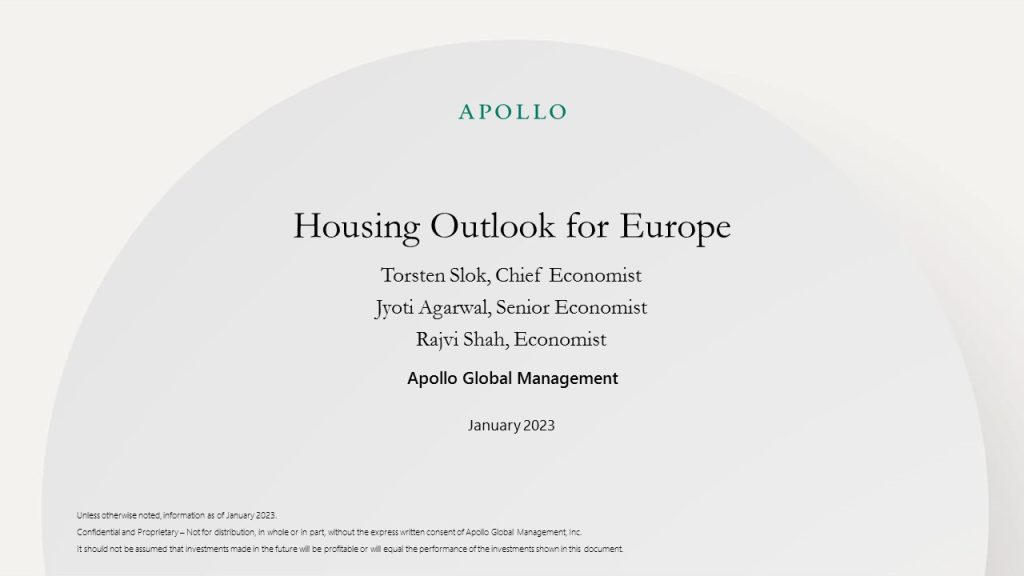
Attached here is our collection of daily and weekly indicators for the US economy, and the data shows some weakening in recent weeks with weaker retail sales, risks of higher jobless claims, and a rise in bankruptcies, see charts below. To be sure, the latest employment report was very strong, with 223,000 jobs created in December and the unemployment rate falling to 3.5%, but the daily and weekly high-frequency indicators are beginning to show some signs of weakness in the US economy.
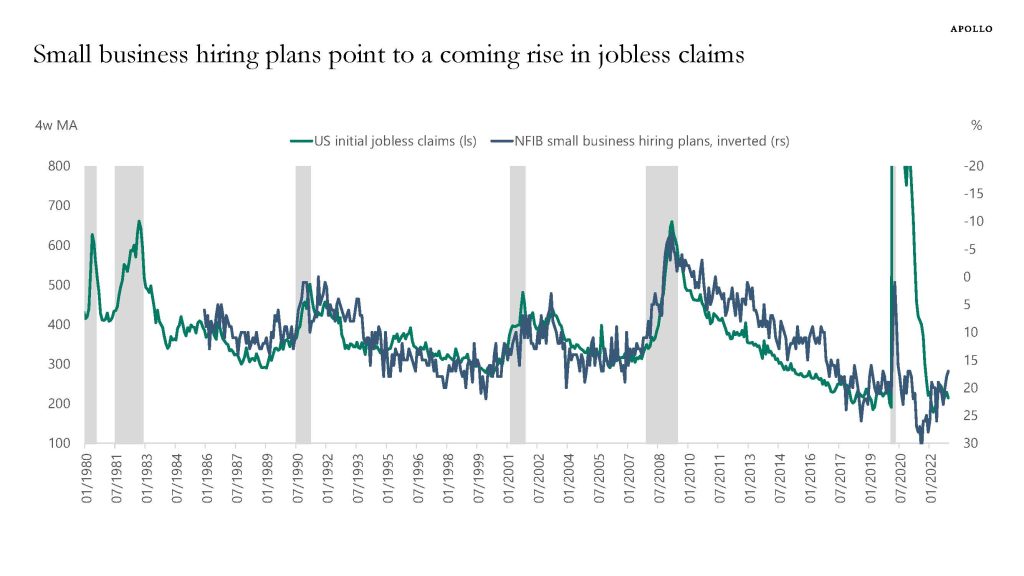
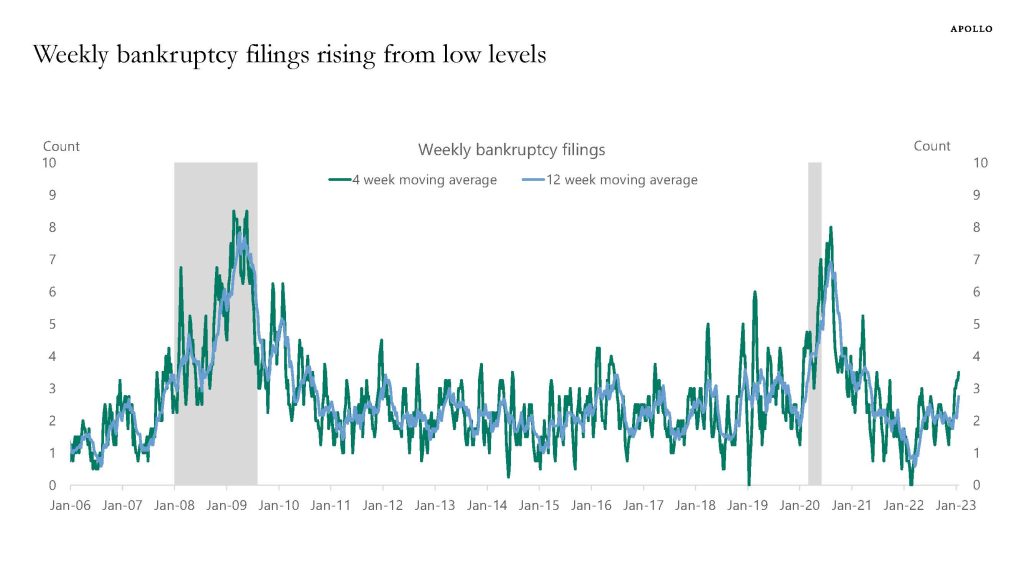
We are going through an asset price recession and not an economic recession. Why? Because we should expect the Fed funds rate to decline from the peak at 5% in June toward the equilibrium interest rate which keeps the economy at full employment and inflation at 2%. The Fed estimates that this so-called r-star is around 2.5%, see also the Fed’s latest dot plot. The implication for investors is that the level of the risk-free rate is resetting higher than where it was before the pandemic, see chart below. And this permanent increase in the costs of capital has a wide range of consequences for corporate America and financial markets, including how to think about credit spreads and stock prices, in particular tech and growth.
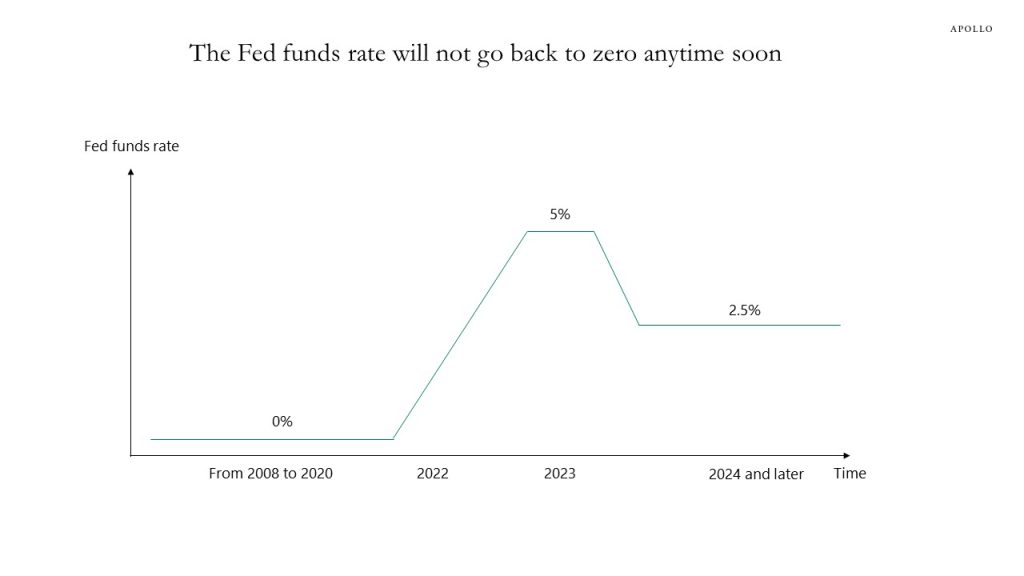
Since the pandemic began, there has been a structural increase in the number of people who are sick, see the chart below, which shows a significant jump in the number of people with a job who are not at work due to illness. The permanent change in the number of people who are ill since the pandemic began is consistent with studies here, here, and here that find that Covid is a key reason workers are still missing in the workforce, and hence why the labor force participation rate remains subdued. Immigration growth is rising steadily, but the bottom line is that it will take time before wage inflation is back at pre-pandemic levels, and, as a result, the Fed will keep rates higher for longer.
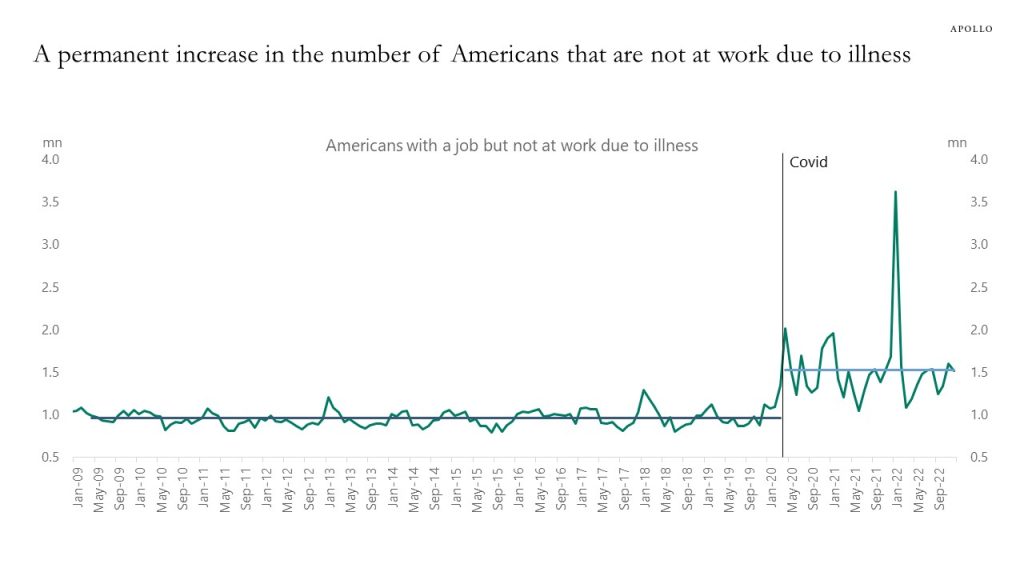
The BoJ is carefully preparing markets for the end of YCC, and that is likely the reason why the impact on US rates is so muted, see the first chart. But gradually higher yields in Japan will likely continue to push the yen higher, see the second chart.
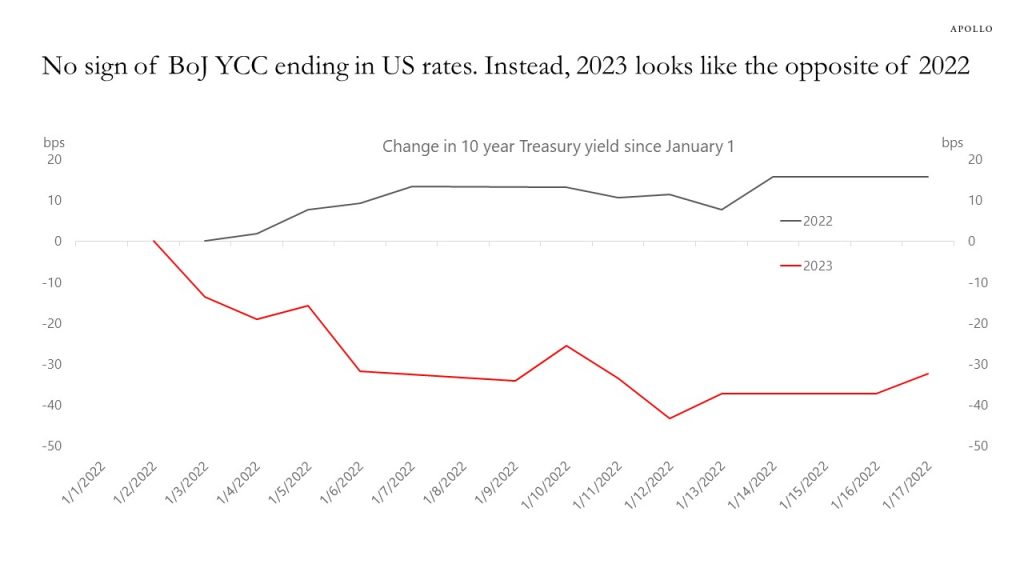
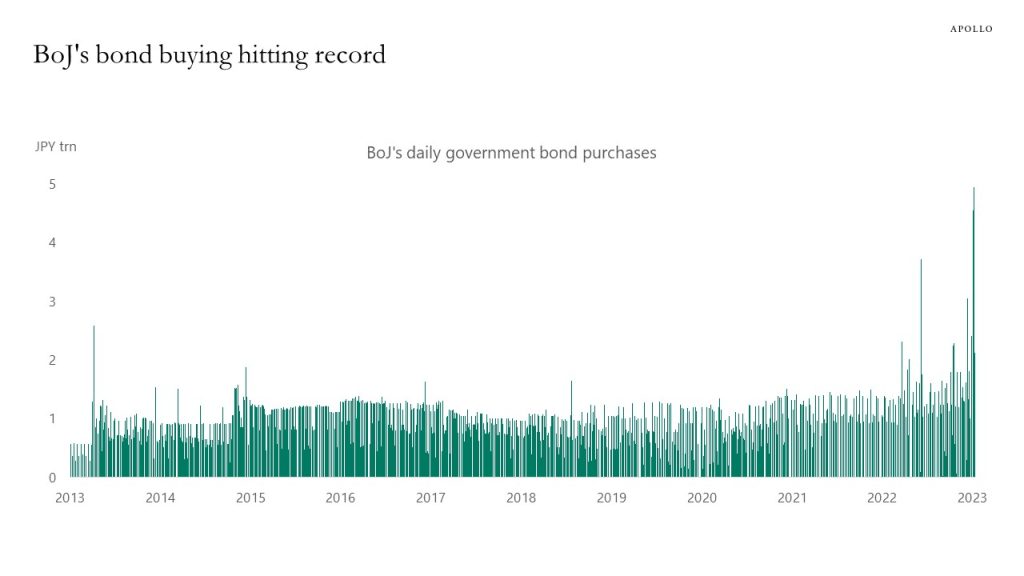
China is reopening, and this will be positive for global growth, see chart below. But because of the virus, commodity prices are not quite yet moving higher, and the impact on US inflation is likely to be modest and drawn out over time.
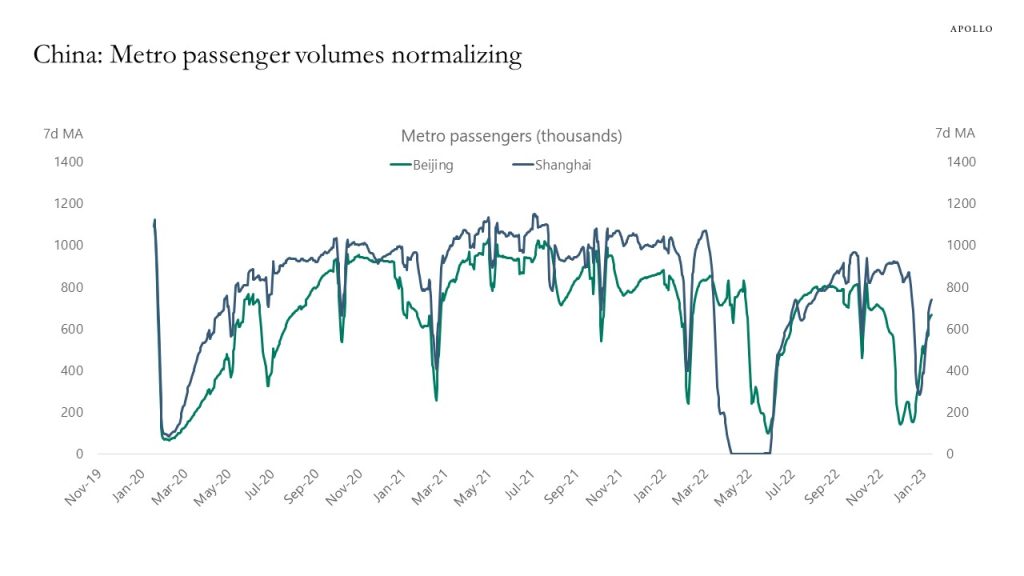
The 3-month and 6-month annualized change in inflation show some significant downside momentum in inflation in recent months, see chart below. Our daily and weekly economic indicators for the US economy are available here.
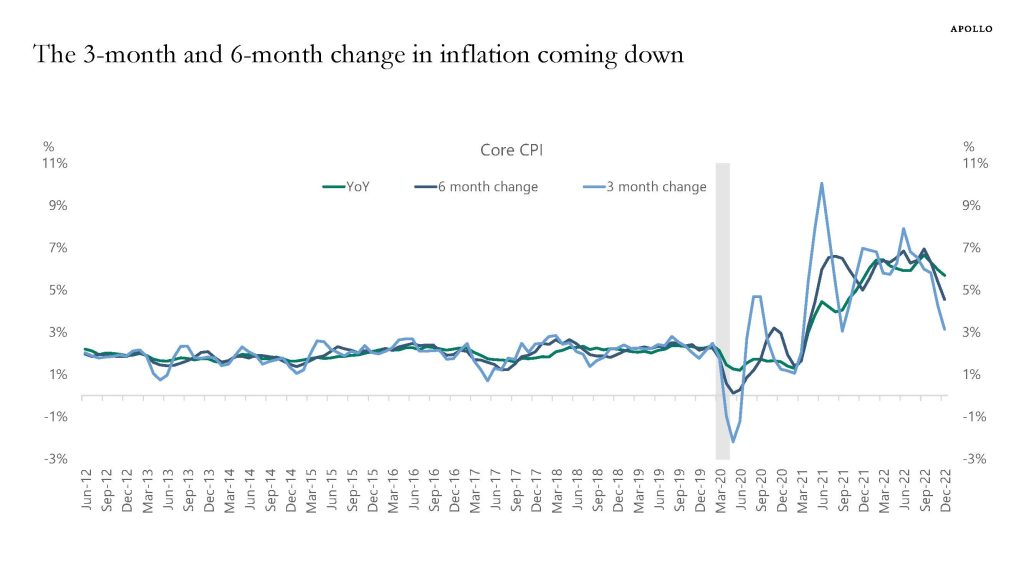

Last week we got the very important Consumer Price Index (CPI) inflation data for December, from which we learned that inflation continues to trend lower, declining to 6.5% from 7.1% the month prior. In looking at the components of inflation, goods inflation continues to decline but services inflation remains elevated. Inflation related to shelter moved higher. Overall, this is good news for markets, but we need to see all of the components come down—especially housing. Regardless of the progress made, 6.5% is still far from the Federal Reserve’s 2% target, and we can expect the Fed to remain hawkish over the next few months to continue to move things in the right direction. But as inflation continues to decline, markets may become more bullish—having the opposite effect on the economy that the central bank is working to achieve. In this scenario, the Fed may have to be even more hawkish to get to 2%. This loop will continue as long as inflation is elevated.
This presentation may not be distributed, transmitted or otherwise communicated to others in whole or in part without the express consent of Apollo Global Management, Inc. (together with its subsidiaries, “Apollo”).
Apollo makes no representation or warranty, expressed or implied, with respect to the accuracy, reasonableness, or completeness of any of the statements made during this presentation, including, but not limited to, statements obtained from third parties. Opinions, estimates and projections constitute the current judgment of the speaker as of the date indicated. They do not necessarily reflect the views and opinions of Apollo and are subject to change at any time without notice. Apollo does not have any responsibility to update this presentation to account for such changes. There can be no assurance that any trends discussed during this presentation will continue.
Statements made throughout this presentation are not intended to provide, and should not be relied upon for, accounting, legal or tax advice and do not constitute an investment recommendation or investment advice. Investors should make an independent investigation of the information discussed during this presentation, including consulting their tax, legal, accounting or other advisors about such information. Apollo does not act for you and is not responsible for providing you with the protections afforded to its clients. This presentation does not constitute an offer to sell, or the solicitation of an offer to buy, any security, product or service, including interest in any investment product or fund or account managed or advised by Apollo.
Certain statements made throughout this presentation may be “forward-looking” in nature. Due to various risks and uncertainties, actual events or results may differ materially from those reflected or contemplated in such forward-looking information. As such, undue reliance should not be placed on such statements. Forward-looking statements may be identified by the use of terminology including, but not limited to, “may”, “will”, “should”, “expect”, “anticipate”, “target”, “project”, “estimate”, “intend”, “continue” or “believe” or the negatives thereof or other variations thereon or comparable terminology.